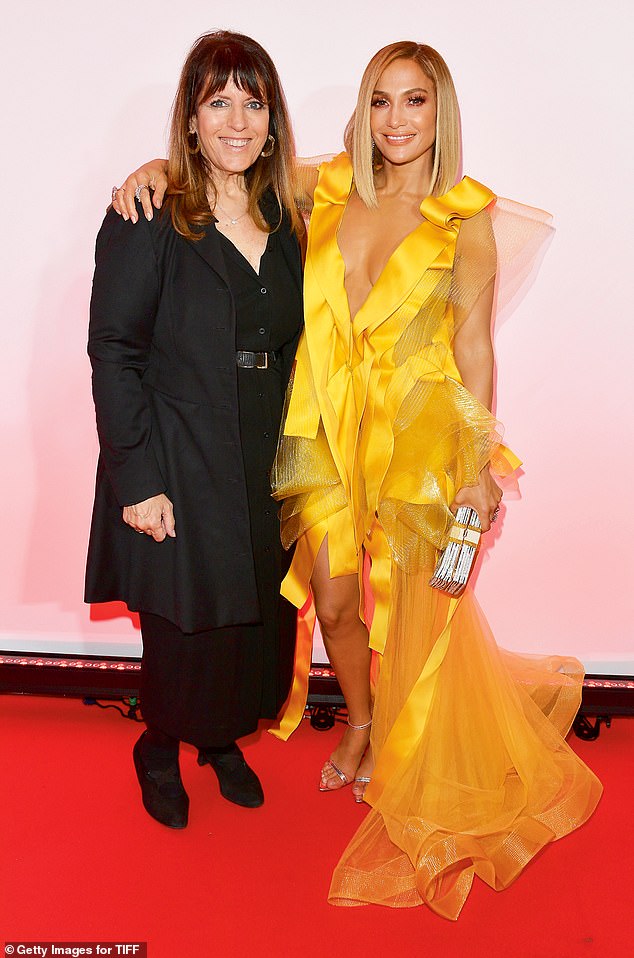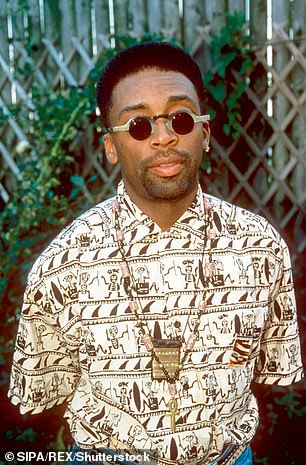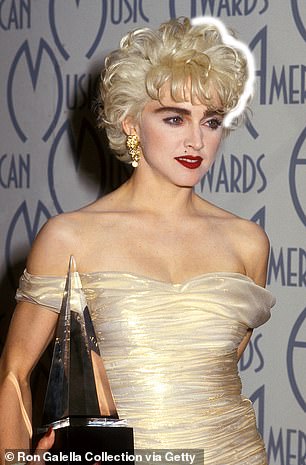A s a junior Hollywood agent for the William Morris Agency, in 1987 Elaine Goldsmith-Thomas was told to look after one of its clients, the suave Egyptian actor Omar Sharif, for an evening. ‘He suggested dinner and chose Perino’s, the most expensive restaurant in Los Angeles,’ she recalls. ‘Then he started calling friends who joined us. There were pre-dinner drinks, dinner, more drinks, champagne, caviar. By the end there were about 11 people at our table and we closed the restaurant. When the bill finally came it was $4,000, which was a fortune back then. And he just handed it to me and said, ‘Thank you.’
This is only one of the stories Goldsmith-Thomas amassed as she worked her way to becoming a high-profile agent in La La Land in the 1980s and 90s, when excess was the norm. She represented Madonna, Julia Roberts, Spike Lee and Nicolas Cage, before become the producing partner of close friend and former client Jennifer Lopez. Now she has written a novel, Climbing In Heels, about a trio of pioneering shoulder-padded female agents vying to sign movie stars in a milieu rife with sex, drugs and harassment.
The book was snapped up before publication and sold as a blockbuster series to the US streaming service Peacock by another old friend of Goldsmith-Thomas’s, Darren Star, creator of Sex And The City and Emily In Paris. The scandalous happenings it features – from swimming-pool shags to office blowjobs, ruthless client-poaching to cocaine binges – are, it seems, mostly real. As is its depiction of the predatory sexism that pervaded the ‘boys’ club’ of talent agencies back then.

Elaine Goldsmith-Thomas with Jennifer Lopez, 2019
‘I didn’t want to write a feminist manifesto, that wouldn’t be true,’ says Goldsmith-Thomas of the book’s non-judgmental tone. ‘Some of these things happened to me, some I invented, but if anything it’s understated – I actually took stuff out because I thought, ‘Holy f**k, what am I doing?’ If you look at Weinstein and people like him now paying the price, they were trained in the 80s.
‘Weinstein was not the exception – he was the rule. It was a wild, wild west, and I didn’t know it was bad because that was the world I was in. There were women who were older than me who mentored me but if you complained to them [about sexism or harassment], they’d say, ‘Grow a pair.’ One used to joke that she’d f**ked her way to the middle.’ (Goldsmith-Thomas won’t tell me her age but she is now mid 60s.)
Early in her career she was dissuaded by a senior woman from delivering a contract to the hotel suite of comedian (and sexual predator) Bill Cosby. She later got into trouble when another client, French-Canadian actor Robert Goulet, began ad-libbing about his ex-wife instead of delivering his opening lines in a play, before telling the 5,000-strong theatre audience in Ohio to ‘go f**k yourselves’ and walking offstage.
The famous people she’s prepared to dish dirt on tend to be dead, like Goulet and Sharif, or convicted criminals, like Weinstein and Cosby. About others she’s more tight-lipped. The famously eccentric Nic Cage was ‘incredibly sweet, brilliantly talented and recognised great material’, while the notoriously demanding Madonna was also ‘brilliant’. ‘People who have achieved greatness,’ she adds, ‘it tends not to be by accident.’
The one person she’s open about is Lopez, who she represented as an agent from 1998 before joining her company Nuyorican Productions in 2012, going on to produce movies such as Hustlers. ‘When I had breast cancer in 2004, Jennifer flew in for every chemo session and rubbed my bald head,’ she says.
Goldsmith-Thomas and her husband of almost 30 years, lawyer Daniel Thomas, spent the days before last Christmas with Lopez and her children (the couple don’t have kids, partly due to Goldsmith-Thomas’s cancer treatment, she says), four months after Lopez’s divorce from Ben Affleck. ‘She is happy. She is focused and we are shooting a comedy. She’s a great mother to her kids and stepmother to Ben’s with Jen [Jennifer Garner].’ In a recent Instagram post to promote a book-signing, Goldsmith-Thomas tells Lopez she can ask her anything about her career. ‘And she goes, ‘How much blow [cocaine] did you do?’ the author says, laughing.
In her novel, three women – sometimes friends, sometimes frenemies – hustle their way to the top of the agenting tree in diverse ways. Waspy Ella Gaddy rises despite refusing to conform to the norms of her upper-class upbringing, the era’s sexual orthodoxy or the agency game. Illegitimate, impoverished Brit Millicent Baxter reinvents herself as exotic Mercedes and seduces her way up the ladder. Jewish Valley girl Beanie Rosen is the most driven and the one whose relationships, while sometimes unwise (and in one case defined by a singular sexual practice), are heartfelt rather than cynical. ‘There is a lot of Beanie in me,’ admits Goldsmith-Thomas, herself born into a Jewish family in the San Fernando Valley. Beanie’s route into showbiz mirrors her own.


Her clients have included Spike Lee and Madonna
‘Before I went to college I had a very short actor boyfriend who wanted an agent,’ she says. ‘I worked in a card shop in the Valley and had the girls who worked there compile a list of agents – 5,000 of them – then spent summer trying to get him signed. I wanted to deliver that ‘yes’. You had to befriend the receptionist to get to the secretary to get to the agent. And when they turned me down, I’d invent reasons to keep him on the hook – I was afraid he’d leave me.
‘I paid for his headshots, doled out sexual favours to him, eventually got him signed – and he dumped me. It broke my heart, but I never forgot how good it felt when I got that ‘yes’. So I applied to the William Morris Agency as a secretary, and when I eventually became an agent the first call I got was from him.’ She didn’t sign him. Now, ‘I see his little bald head on real-estate signs.’
In the 1980s, talent agencies were a man’s world and a straight white man’s world at that. Gay men’s careers were curtailed, non-white employees were hired as window-dressing to make non-white clients feel comfortable, and all young women were seen as fair game. ‘I don’t think we knew it was sexist,’ she says. ‘We were, ‘Wow, they’re letting us into the club!’ Whatever the rules, we had to play.’
Since she was ‘curvy’ and ‘probably reminded them of their moms or sisters’, Goldsmith-Thomas relied on drive rather than sex appeal. ‘Helping somebody attain their dreams fulfilled me in a way I can’t explain. Was there a lot of sex there? I was in monogamous relationships – though, you know, not completely.’ She snickers. ‘And yes, there were drugs; a parking attendant at William Morris was the biggest dealer.’
The book shows the three women growing almost as monstrous as the men; and after a decade at both William Morris then ICM, Goldsmith-Thomas quit agenting to become a producer. ‘Was I monstrous? Sure. I was bull-headed. I was strong. I had to be. But I only stopped being an agent because I really wanted to write.’ She’d done uncredited script polishes for years, but it was Lopez, ‘a dancer who became an actor who became a singer who became a brand, who doesn’t see the sky as the limit but as a resting place’, who persuaded her to go for it.
‘I wanted to write a soapy Valley Of The Dolls, Peyton Place kind of book that would be fun reading yet was true,’ she says. The first person she showed the unfinished manuscript to was Darren Star, who she’d known since he was a junior publicist and she was an agent’s assistant in the 80s. Four days later he said, ‘I’m optioning this.’ And four days after that it was sold in a six-figure deal to Universal (with whom Star has a multi-year producing and development deal), then seized on by Peacock.
‘We’re gonna start writing it in May,’ says Goldsmith-Thomas. ‘We’ve had calls from some very big stars.’ There has also been a positive response from a demographic that surprised her. ‘I’m hearing so much from young women, 21-year-olds who are fascinated by the times and what we did and how we did it, and I guess the sex,’ she says, slightly aghast. ‘They’re going, ‘God, it seems so great.’ I guess they look at it that way because everything now is so hard and so corporate. Isn’t that funny?’











